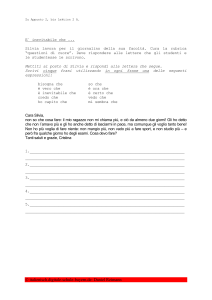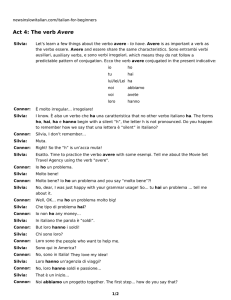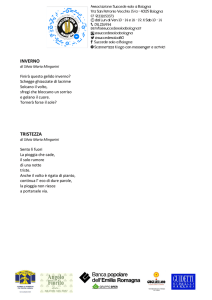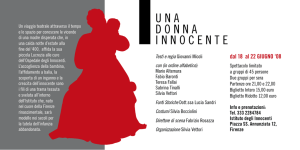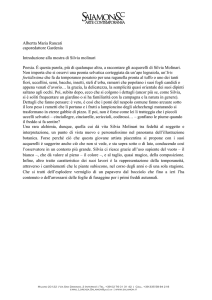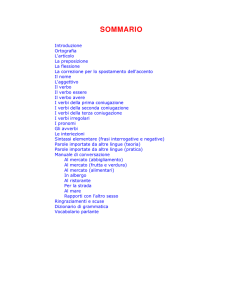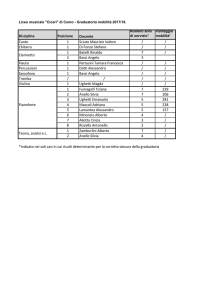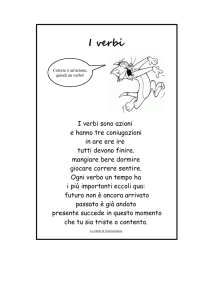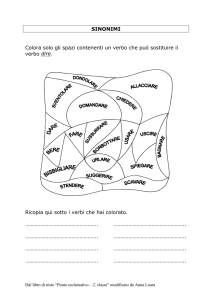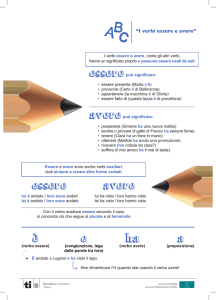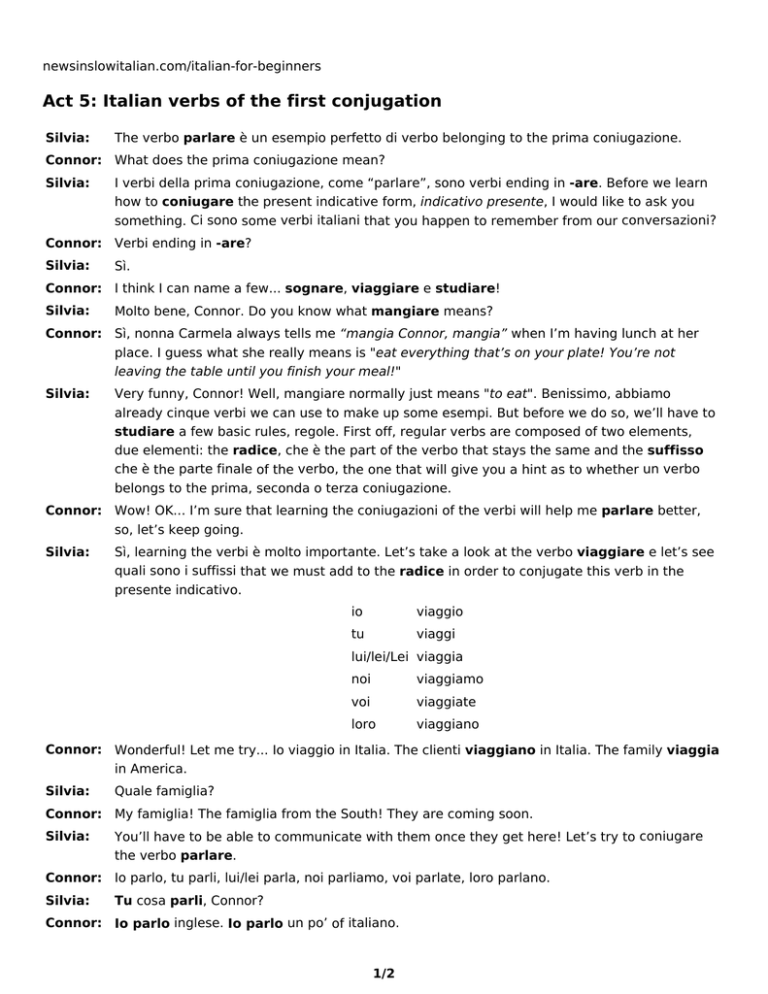
newsinslowitalian.com/italian-for-beginners
Act 5: Italian verbs of the first conjugation
Silvia:
The verbo parlare è un esempio perfetto di verbo belonging to the prima coniugazione.
Connor: What does the prima coniugazione mean?
Silvia:
I verbi della prima coniugazione, come “parlare”, sono verbi ending in -are. Before we learn
how to coniugare the present indicative form, indicativo presente, I would like to ask you
something. Ci sono some verbi italiani that you happen to remember from our conversazioni?
Connor: Verbi ending in -are?
Silvia:
Sì.
Connor: I think I can name a few... sognare, viaggiare e studiare!
Silvia:
Molto bene, Connor. Do you know what mangiare means?
Connor: Sì, nonna Carmela always tells me “mangia Connor, mangia” when I’m having lunch at her
place. I guess what she really means is "eat everything that’s on your plate! You’re not
leaving the table until you finish your meal!"
Silvia:
Very funny, Connor! Well, mangiare normally just means "to eat". Benissimo, abbiamo
already cinque verbi we can use to make up some esempi. But before we do so, we’ll have to
studiare a few basic rules, regole. First off, regular verbs are composed of two elements,
due elementi: the radice, che è the part of the verbo that stays the same and the suffisso
che è the parte finale of the verbo, the one that will give you a hint as to whether un verbo
belongs to the prima, seconda o terza coniugazione.
Connor: Wow! OK... I’m sure that learning the coniugazioni of the verbi will help me parlare better,
so, let’s keep going.
Silvia:
Sì, learning the verbi è molto importante. Let’s take a look at the verbo viaggiare e let’s see
quali sono i suffissi that we must add to the radice in order to conjugate this verb in the
presente indicativo.
io
viaggio
tu
viaggi
lui/lei/Lei viaggia
noi
viaggiamo
voi
viaggiate
loro
viaggiano
Connor: Wonderful! Let me try... Io viaggio in Italia. The clienti viaggiano in Italia. The family viaggia
in America.
Silvia:
Quale famiglia?
Connor: My famiglia! The famiglia from the South! They are coming soon.
Silvia:
You’ll have to be able to communicate with them once they get here! Let’s try to coniugare
the verbo parlare.
Connor: Io parlo, tu parli, lui/lei parla, noi parliamo, voi parlate, loro parlano.
Silvia:
Tu cosa parli, Connor?
Connor: Io parlo inglese. Io parlo un po’ of italiano.
1/2
Silvia:
Che lingua parla the famiglia italiana?
Connor: Nonno Giovanni e nonna Carmela parlano italiano e inglese e the family from the South
parla only italiano.
Silvia:
Loro non parlano inglese?
Connor: Not at all!
Silvia:
Noi adesso studiamo italiano, so you’ll be able to speak with them.
Connor: Sì e loro... how do you say “they are studying”?
Silvia:
You can say “loro studiano”.
Connor: So, if I said loro studiano inglese, would it mean that they are studying English now?
Silvia:
Sì. Additionally, the present indicative can be used to describe a certain action that will take
place in the near future. For example: Tu viaggi in Italia tomorrow? Sì, viaggio in Italia
domani.
Connor: OK.
Silvia:
Tu sogni l’Italia?
Connor: Io sogno l’Italia all the time.
Silvia:
E la famiglia from the South?
Connor: Loro sognano l’America...
Silvia:
Well, adesso, now, studiamo la seconda parte of the lezione di grammatica italiana.
Connor: Sì, studiamo!
2/2


